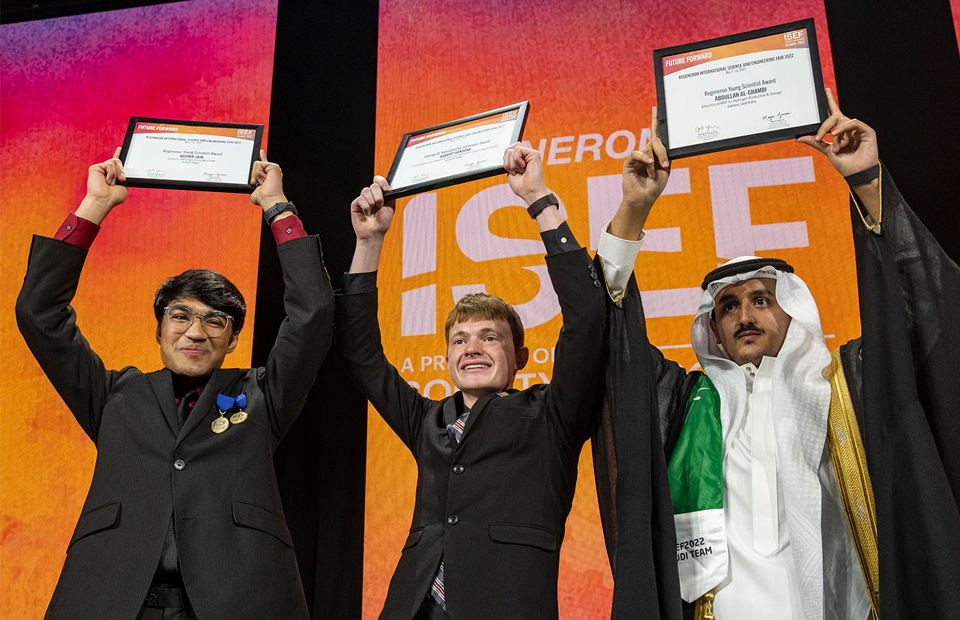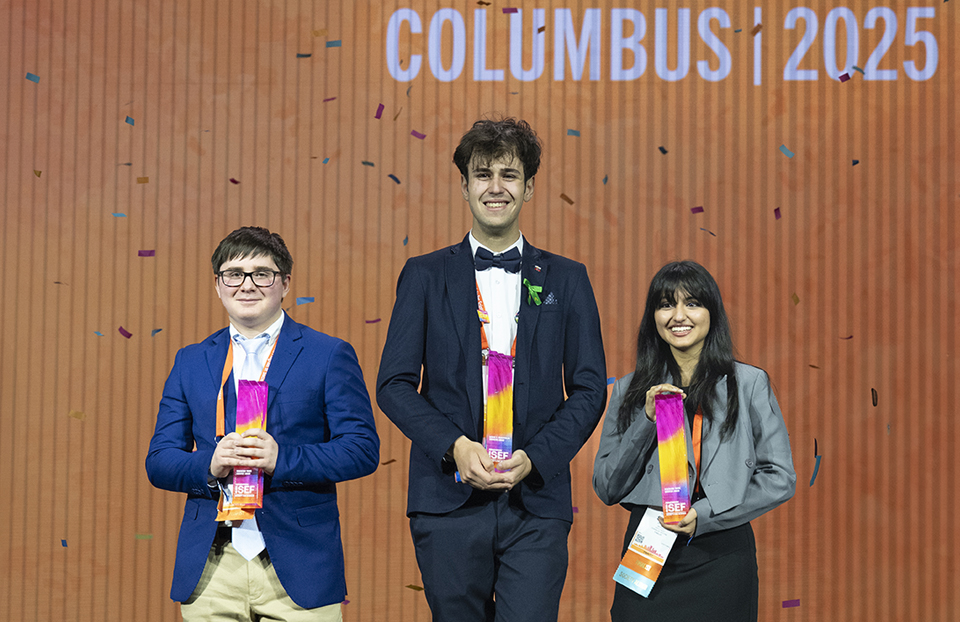High School scientists from around the world win nearly $8 million in awards, scholarships at the Regeneron International Science and Engineering Fair

Regeneron Pharmaceuticals, Inc. and Society for Science announced that Robert Sansone, 17, of Fort Pierce, FL, won the $75,000 top award in the 2022 Regeneron International Science and Engineering Fair (Regeneron ISEF), the world’s largest global high school competition, for a project that explored high-efficiency alternatives to induction motors. Other top prizes went to projects in the fields of energy storage, biomedical engineering and robotics.
The top winners were honored during two hybrid award ceremonies, the first of which took place on the evening of May 12 and featured Special Award winners. The Grand Awards Ceremony was held on the morning of May 13 and featured the announcement of the top prize of $75,000. In total, awards valued at nearly U.S. $8 million were awarded to the finalists, who were evaluated based on their projects’ creativity, innovation and level of scientific inquiry. The competition featured 1,750 young scientists representing 49 states and 63 countries, regions and territories across the world.
Robert Sansone won first place and received the $75,000 George D. Yancopoulos Innovator Award, named in honor of the pioneering drug discoverer and Regeneron co-founder, President and Chief Scientific Officer. Robert’s research improved the torque (force) and efficiency of synchronous reluctance motors, which are rugged, efficient, magnet-free alternatives to traditional permanent magnet motors. He hopes his research will lead to the proliferation of electric vehicles that do not require magnets made from strategically important rare-earth elements.
Abdullah Al-Ghamdi, 17, of Dammam, Saudi Arabia, received one of two Regeneron Young Scientist Awards of $50,000 for modifying a metal-organic material so it could be used to both extract hydrogen from water and safely store it for clean energy production. Because the materials he added are relatively inexpensive, his work could significantly reduce the cost of hydrogen extraction and storage.
Rishab Jain, 17, of Portland, Oregon, received the second Regeneron Young Scientist Award of $50,000 for developing an AI-based model to enable rapid and cost-effective production of drugs, such as recombinant COVID-19 vaccines, using synthetic DNA engineering. His model is trained to optimize the selection of genetic codes in DNA.
“Congratulations to the Regeneron International Science and Engineering Fair 2022 winners,” said Maya Ajmera, President and CEO of Society for Science and Publisher of Science News. “Every single Regeneron ISEF finalist has shown true dedication, passion, and grit. Their commitment to their research, and perseverance throughout the continued challenges of COVID-19 are an inspiration to us all. We are eager to watch the impact they are sure to make in their communities and chosen fields.”
Regeneron ISEF provides a global stage for the best and brightest young scientists and engineers around the world. Founded on the belief that advances in science are key to solving global challenges, Regeneron ISEF supports and invests in the next generation of leading STEM thinkers who are generating ideas and acting as catalysts for the change needed to improve the well-being of all people and the planet.
“These exceptionally talented Regeneron ISEF finalists are some of the brightest minds from around the world and our greatest hope for addressing global challenges in the future,” said George D. Yancopoulos, M.D., Ph.D., co-founder, President and Chief Scientific Officer of Regeneron. “Science is critical to the survival of our society, and these finalists have limitless potential to make a positive impact on the world. I congratulate them for their hard work and am eager to see what they achieve in their scientific journeys.”
For the first time since 2019, ISEF finalists competed in person. More than half of the finalists gathered in Atlanta, GA at the Georgia World Congress Center and the remaining finalists participated virtually.
Other top honors from the competition include:
Napassorn Litchiowong, 17; Chris Tidtijumreonpon, 16; and Wattanapong Uttayota, 17, of Mueang Chiang Mai, Thailand received the Gordon E. Moore Award of $50,000 for Positive Outcomes for Future Generations for their creation of a faster and more accurate way to diagnose a type of liver fluke infection that can lead to bile duct cancer in humans. The team built and trained neural network software to identify the parasite’s eggs in microscopic fecal images with 98% accuracy and then developed a rapid screening questionnaire that was 91% accurate.
Amon Schumann, 17, of Berlin, Germany, received the Craig R. Barrett Award for Innovation of $10,000 for developing balloon-borne, light-weight solar-powered instruments that transmit aerial images, telemetry and climate data to a website he created. His device can stay aloft for several weeks circumnavigating the Earth at a consistent altitude and greatly reduces instrumentation costs.
Rebecca Cho, 17, of Jericho, New York, received the H. Robert Horvitz Prize for Fundamental Research of $10,000 for creating a geological model that incorporates the effects of changing landscapes, climate, sea level and erosion. Her model can be used to investigate ecological changes over 20 million years in the western U.S. and potentially predict the effects of climate change on the area’s biodiversity.
Anika Puri, 17, of Chappaqua, New York, received the Peggy Scripps Award for Science Communication of $10,000 for her low-cost machine learning software that can analyze night-time infrared videos taken by a drone flown over the African wilderness to spot elephant poachers in real time. In tests, her $300 system worked with 91% accuracy, a fourfold improvement over current systems, without needing high-resolution thermal cameras that can cost up to $10,000.
More information about the top winners and visual assets can be found at https://www.societyforscience.org/isef-2022-media-kit/
Asmi Kumar, 18, of Milton, Georgia; Emirhan Kurtulus, 18, of Istanbul, Turkey; and Joshua Shunk, 17, of Gilbert, Arizona received the Dudley R. Herschbach SIYSS Award, which provides the finalists with an all-expense paid trip to attend the Stockholm International Youth Science Seminar, which includes attendance at the Nobel Prize Ceremonies in Stockholm, Sweden.
Varun Madan, 17, of Orlando, Florida; and Saan Cern Yong, 16, and Shen Ze Yeoh, 15, both of Petaling Jaya, Malaysia, received the EU Contest for Young Scientists Award, which is presented to two projects that will represent Regeneron ISEF at the EU Contest for Young Scientists to be held in Leiden, Netherlands, September 12-18, 2022.
For a full list of finalists who won awards, please visit HERE and HERE.
In addition to the Top Award winners, 442 finalists received awards and prizes for their innovative research, including “First Award” winners, who each received $5,000. The following lists the First Award winners for each of the 21 categories, from which the Top Awards were chosen:
| Category and Sponsor | Winner | Location |
| Animal Sciences, sponsored by Society for Science | Yi-Shan Hung | Taipei City, Taiwan |
| Varun Madan | Orlando, FL | |
| Behavioral and Social Sciences, sponsored by Society for Science | Asmi Kumar | Milton, GA |
| Vivek Kogilathota | Frisco, TX | |
| Biochemistry, sponsored by Regeneron | Maya Butani | Moorestown, NJ |
| Biomedical and Health Sciences, sponsored by Regeneron | Jonathan Crawford | Milwaukee, WI |
| Ambika Grover | Greenwich, CT | |
| Biomedical Engineering, sponsored by Johnson & Johnson | Rishab Jain | Portland, OR |
| Emirhan Kurtulus | Istanbul, Turkey | |
| Cellular and Molecular Biology, sponsored by Regeneron | Shivani Babu | Auburn, AL |
| Chemistry, sponsored by Dow | Dana Al Aithan | Al Hofuf, Saudi Arabia |
| Nishant Lahiri | Corning, NY | |
| Computational Biology and Bioinformatics, sponsored by Regeneron | Wutthipong Chongchareansanti | Nakhon Pathom, Thailand |
| Pawit Kaewnuratchadasorn | ||
| Nattawin Yamprasert | ||
| Kevin Zhu | Jericho, NJ | |
| Earth and Environmental Sciences, sponsored by National Geographic Society | Rebecca Cho | Jericho, NJ |
| Anika Puri | Chappaqua, NY | |
| Embedded Systems, sponsored by Microsoft Azure Sphere | James Nagler | Garden City, NY |
| Energy: Sustainable Materials and Design, sponsored by King Abdul-Aziz & his Companions Foundation for Giftedness & Creativity | Abdullah Al-Ghamdi | Dammam, Saudi Arabia |
| Engineering Technology: Statics and Dynamics, sponsored by Howmet Aerospace Foundation | Robert Sansone | Fort Pierce, FL |
| Amon Schumann | Berlin, Germany | |
| Environmental Engineering, sponsored by Jacobs | Yanbing Jin | Shanghai, China |
| Vedant Srinivas | Sammamish, WA | |
| Materials Science, sponsored by Howmet Aerospace Foundation | Sohi Patel | The Woodlands, TX |
| Mathematics, sponsored by Akamai Foundation | Akilan Sankaran | Albuquerque, NM |
| Microbiology, sponsored by Regeneron | Shriya Bhat | Plano, TX |
| Physics and Astronomy, sponsored by Richard F. Caris Charitable Trust II | Ayush Nayak | San Diego, CA |
| Alexander Plekhanov | Hillsboro, OR | |
| Plant Sciences, sponsored by Society for Science | John Benedict Estrada | Fresno, CA |
| Pauline Estrada | ||
| Robotics and Intelligent Machines, sponsored by Siegel Family Endowment | Joshua Shunk | Gilbert, AZ |
| Sheng Ze Yeoh | Petaling Jaya, Malaysia | |
| Saan Cern Yong | ||
| Systems Software, sponsored by Microsoft | Andrei Florian | Dublin, Ireland |
| Translational Medical Science, sponsored by Regeneron | Napassorn Litchiowong | Mueang Chiang Mai, Thailand |
| Chris Tidtijumreonpon | ||
| Wattanapong Uttayota |
View all the finalists’ research here.
About the Regeneron International Science and Engineering Fair
The Regeneron International Science and Engineering Fair (Regeneron ISEF), a program of Society for Science for over 70 years, is the world’s largest global science competition for high school. Through a global network of local, regional and national science fairs, millions of students are encouraged to explore their passion for scientific inquiry. Each spring, a group of these students is selected as finalists and offered the opportunity to compete for approximately U.S. $8 million in awards and scholarships.
In 2019, Regeneron became the title sponsor of ISEF to help reward and celebrate the best and brightest young minds globally and encourage them to pursue careers in STEM as a way to positively impact the world. Regeneron ISEF is supported by a community of additional sponsors, including Broadcom Foundation, Johnson & Johnson, Gordon and Betty Moore Foundation, Akamai Foundation, Dow, Howmet Aerospace Foundation, Jacobs, King Abdulaziz & his Companions Foundation for Giftedness & Creativity, Microsoft, Microsoft Azure Sphere, National Geographic Society, Richard F. Caris Charitable Trust II, Rise, Siegel Family Endowment, Arconic Foundation, Cesco Linguistic Services, Georgia Institute of Technology, and Insaco. Previously, Intel sponsored ISEF for 20 years.
ISEF alumni have gone on to have world-changing careers in science and engineering and earn some of the most esteemed honors, including National Medal of Science recipients, MacArthur Foundation Fellows, National Academy of Sciences Members and National Academy of Engineering Inductees.
Learn more at https://www.societyforscience.org/isef/.


